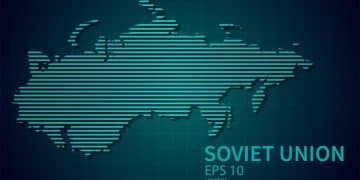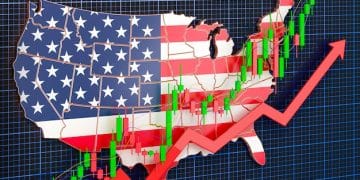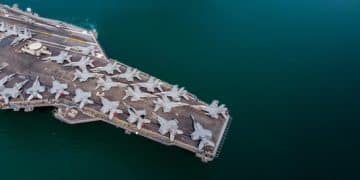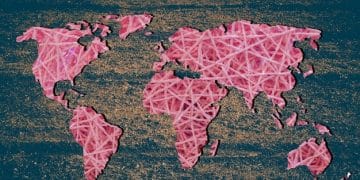US GDP Growth 2025: Impact on Foreign Policy Explained

Advertisements
A projected 2.3% GDP growth in 2025 for the US could significantly reshape its foreign policy, influencing diplomatic prowess, defense spending, trade negotiations, and the nation’s capacity to address global challenges, thereby affecting alliances and international development initiatives.
The trajectory of a nation’s economy is often intricately linked to its global standing and capabilities. As we look towards 2025, a projected 2.3% GDP growth in 2025 for the United States signals a potentially robust economic landscape. But how exactly will this domestic economic vitality translate into shifts and strategies within US foreign policy? This exploration delves into the multifaceted implications of such growth, examining its potential influence on diplomatic efforts, defense postures, trade relationships, and the broader global engagement of the United States.
Economic Strength and Diplomatic Leverage
A stronger domestic economy, as indicated by a 2.3% GDP growth, inherently enhances a nation’s ability to project power and influence on the global stage. Economic prosperity provides the necessary resources and stability to pursue ambitious diplomatic objectives, engage in complex negotiations, and offer substantial aid or incentives to allies and developing nations. This newfound or reinforced economic muscle can significantly alter the dynamics of international relations, both bilaterally and multilaterally.
When a nation’s economic foundation is solid, its diplomacy often gains a more assertive and confident tone. The US, with its economic resilience, can lead from a position of strength, fostering greater cooperation and addressing international challenges more effectively. This economic backing allows for greater flexibility in foreign policy decisions, reducing dependence on external financial pressures and enabling the pursuit of long-term strategic goals.
Enhanced Negotiating Power
A thriving economy provides the US with significant leverage in international negotiations, whether on trade deals, climate agreements, or security pacts. Economic stability means the US can afford to take a firmer stance, offering or withholding economic benefits as part of its diplomatic strategy. This enhanced capacity allows for more favorable outcomes in agreements that serve American interests.
- Improved trade deal terms due to stronger domestic market and purchasing power.
- Greater influence in international financial institutions and development banks.
- Ability to offer more substantial foreign aid packages to secure strategic alliances.
Increased Soft Power Projection
Beyond hard economic leverage, a strong GDP growth also boosts a nation’s soft power. A prosperous economy can symbolize stability, innovation, and opportunity, making the US a more attractive partner for investment, cultural exchange, and educational pursuits. This magnetic pull can attract talent and capital, further cementing the US’s position as a global leader.
The narrative of economic success can inspire other nations, encouraging them to align their policies with American values and models. This indirect influence, often more subtle than direct diplomatic pressure, can be profoundly effective in shaping global norms and fostering a more cooperative international environment. The positive perception of American economic vitality can open doors that might otherwise remain closed.
Defense Spending and Military Capabilities
The link between economic growth and defense spending is often direct and significant. With a projected 2.3% GDP growth, the US will likely find itself in a more comfortable position to maintain, and possibly increase, its defense budget. This financial flexibility directly impacts military readiness, technological innovation, and the scale of international military engagements. A robust economy gives policymakers more options regarding defense and security.
Increased funding can lead to advancements in military technology, better training for personnel, and the ability to project power globally. This sustained investment ensures that the US military remains at the forefront of global defense capabilities, providing a credible deterrent and enabling effective responses to emerging threats.
Modernization of Armed Forces
A healthier economy allows for significant investments in modernizing the armed forces. This includes acquiring advanced weaponry, upgrading existing platforms, and investing in cutting-edge research and development. From hypersonic missiles to artificial intelligence in warfare, these advancements are costly but crucial for maintaining a technological edge.
- Funding for next-generation fighter jets and naval vessels.
- Investment in cybersecurity and space defense capabilities.
- Research and development for new military technologies and strategies.
Global Military Presence and Operations
A strong economic foundation also supports the extensive global military footprint of the US. Maintaining military bases abroad, deploying troops for peacekeeping missions, and conducting joint exercises with allies require substantial financial resources. A growing GDP ensures that these commitments can be met without undue strain on the national budget.
Furthermore, economic buoyancy provides the capacity to respond to unexpected global crises, whether humanitarian or security-related, without diverting critical funds from other essential domestic programs. This ability to be a reliable security partner reinforces alliances and enhances the US’s role as a global security provider.
Trade Policy and International Economic Relations
The projected 2.3% GDP growth in 2025 will inevitably influence US trade policy, both in terms of existing agreements and future negotiations. A strong domestic economy can make the US a more appealing trade partner, potentially leading to new opportunities for exports and foreign investment. It also provides a stronger hand in addressing unfair trade practices or imbalances, allowing the US to negotiate from a position of strength.
This economic vigor can lead to a more assertive stance on trade disputes, potentially pushing for more favorable terms in international trade agreements. The US might prioritize agreements that ensure fair access to markets for its goods and services, while also protecting key domestic industries.
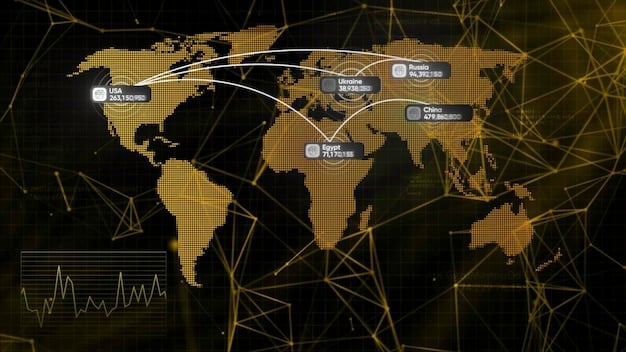
Reshaping Trade Alliances
A growing US economy can incentivize other nations to seek closer trade ties, potentially leading to new alliances or strengthening existing ones. Countries eager to access the robust American market might be more willing to concede on aspects of trade agreements they might otherwise resist. This shift could redefine global trade blocs and supply chains.
- Increased bilateral trade agreements with high-growth economies.
- Re-evaluation of existing multilateral trade agreements to better serve US interests.
- Emphasis on reshoring and securing critical supply chains, diversifying away from single points of failure.
Addressing Global Economic Challenges
With a healthier economy, the US is better positioned to lead efforts in addressing global economic challenges, such as debt crises in developing nations or volatile commodity markets. The capacity to provide financial assistance, technical expertise, or participate in global economic stabilization efforts becomes more robust, solidifying the US’s leadership role.
This leadership extends to shaping the rules of the global economic order, advocating for transparency, fair competition, and sustainable development. A stronger US economy provides the bandwidth to engage meaningfully in forums like the G7 and G20, pushing for policies that benefit both its own economic interests and global stability.
Development Aid and Humanitarian Assistance
Economic growth often correlates with a nation’s capacity and willingness to extend development aid and humanitarian assistance. A 2.3% GDP growth would provide the US with greater financial flexibility to increase its contributions to these critical areas, thereby enhancing its soft power and demonstrating its commitment to global well-being. This can be a vital component of foreign policy, winning hearts and minds and fostering long-term partnerships.
Such aid is not merely altruistic; it often serves strategic interests by promoting stability, reducing poverty, and addressing the root causes of conflict and migration. An economically robust US can afford to be more generous, reinforcing its image as a responsible global actor and a reliable partner in times of crisis.
Strategic Use of Aid
Development and humanitarian aid can be strategically deployed to support democratic transitions, strengthen governance, and build economic capacity in developing nations. This contributes to long-term stability and can prevent future crises that might require more costly interventions. The effectiveness of this aid is often amplified by a robust US economy backing it.
- Increased funding for global health initiatives and disease prevention.
- Support for education and infrastructure projects in strategic regions.
- Enhanced disaster relief efforts and humanitarian responses to crises.
Influence on International Development Agendas
As a significant donor, a wealthier US can exert greater influence on the international development agenda of organizations like the World Bank, IMF, and various UN agencies. This allows the US to champion its values and priorities, such as sustainable development, climate resilience, and human rights, on a global scale.
The ability to make substantial financial commitments encourages other nations to follow suit, creating a ripple effect of increased global investment in development. This collective action can address complex global challenges more effectively, fostering a more interconnected and resilient international community.
Addressing Global Challenges: Climate Change and Pandemics
The projected economic growth positions the US more strongly to tackle pressing global challenges such as climate change and future pandemics. Investing in domestic green technologies and public health infrastructure becomes more feasible, setting an example and providing resources for international cooperation. This translates into leadership in global sustainability efforts and health initiatives.
A strong economy enables the US to lead by example, investing in research and development for renewable energy, sustainable agriculture, and resilient infrastructure. These domestic efforts can then be scaled up for international cooperation, assisting other nations in their own transitions and adaptations.
Climate Leadership and Green Diplomacy
With a robust economy, the US can increase its commitments to international climate initiatives, providing financial and technological assistance to developing nations struggling with climate adaptation and mitigation. This leadership is crucial for accelerating the global transition to a low-carbon economy and fulfilling international climate goals.
- Increased investment in domestic renewable energy and carbon capture technologies.
- Larger contributions to international climate funds and green technology transfers.
- More assertive diplomacy in carbon reduction negotiations and agreements.

Global Health Security and Pandemic Preparedness
A flourishing economy ensures that the US can dedicate significant resources to strengthening global health security frameworks. This includes investing in early warning systems, vaccine development, and equitable distribution mechanisms for medical supplies during health crises. The lessons from recent pandemics underscore the importance of such investments.
The US can play a pivotal role in coordinating international responses to future health threats, leveraging its scientific expertise and financial might to protect both its own citizens and the global population. This proactive engagement is a testament to the comprehensive impact of economic stability on foreign policy.
Alliances and Partnerships Reinforcement
A strong US economy makes it an even more attractive and reliable ally. For nations reliant on US security guarantees, trade partnerships, or financial aid, continued US economic strength provides reassurance and stability. This facilitates deeper military, economic, and diplomatic cooperation, reinforcing existing alliances and potentially forming new ones.
Alliances are often built on shared interests and mutual benefit, and economic strength significantly enhances the perceived benefit of partnering with the US. This allows for more effective burden-sharing and coordinated responses to regional and global threats, solidifying the US’s network of influence.
Strengthening Bilateral Security Pacts
Economically robust, the US can better honor its commitments under existing security pacts, such as NATO or its treaties with Japan and South Korea. This includes joint military exercises, sharing of intelligence, and the deployment of advanced defense systems. The capacity to sustain these commitments is vital for maintaining the trust and solidarity of allies.
- Increased foreign military financing and training programs for key allies.
- Joint development of advanced defense systems and interoperability efforts.
- Greater diplomatic engagement to resolve regional disputes and enhance collective security.
Fostering New Strategic Partnerships
A growing US economy might also open doors for developing new strategic partnerships, particularly with emerging economies seeking stable and prosperous allies. These new alliances can diversify the US’s diplomatic reach and provide new avenues for economic and security cooperation. The ability to offer attractive incentives, whether economic or security-related, is key.
These partnerships can be vital in addressing new geopolitical realities, balancing influence, and promoting shared values across diverse regions. With a solid economic foundation, the US can embark on these new ventures with greater confidence and resources, shaping the future international landscape.
| Key Area | Projected Impact |
|---|---|
| 💼 Diplomatic Leverage | Increased capacity for assertive negotiations and offering incentives as a strong global leader. |
| 🛡️ Defense Spending | Greater financial flexibility for military modernization and global presence. |
| 🤝 Trade Policy | Stronger hand in trade agreements, potentially reshaping global alliances. |
| 🌱 Global Challenges | Enhanced ability to lead on climate change and pandemic preparedness initiatives. |
Frequently Asked Questions
▼
GDP growth directly strengthens diplomatic power by providing resources for foreign aid, development projects, and economic incentives, enabling a nation to negotiate more effectively and exert greater influence in international forums. A robust economy also projects an image of stability and reliability, enhancing soft power.
▼
While economic growth provides the means for military spending and operations, it doesn’t automatically lead to increased interventions. It offers greater flexibility to maintain military readiness, modernize forces, and support alliances, which could strengthen deterrence and provide options for responses to global threats, but political will also plays a key role.
▼
A stronger US economy provides significant leverage in trade negotiations. It can lead to more favorable terms for the US, potentially reshaping existing agreements and encouraging new partnerships. The US will likely prioritize fair market access for its goods and services while possibly taking a firmer stance against perceived unfair trade practices.
▼
Increased GDP growth often translates to greater capacity for humanitarian aid. The US would have more financial flexibility to contribute to disaster relief, development projects, and global health initiatives, reinforcing its role as a responsible global actor and enhancing its soft power through compassionate engagement.
▼
Yes, a stronger economy would enable the US to invest more in green technologies domestically and increase its financial and technological assistance to other nations for climate adaptation and mitigation. This strengthens its leadership in international climate negotiations and pushes for more ambitious global environmental goals.
Conclusion
The projected 2.3% GDP growth for the US in 2025 stands to be a pivotal factor in shaping the nation’s foreign policy trajectory. From bolstering diplomatic leverage and enhancing military capabilities to recalibrating trade relations and increasing capacity for global development aid, the economic landscape provides a robust foundation for US engagement on the world stage. This economic vitality can enable the US to address complex global challenges with greater financial flexibility and strategic confidence, ultimately reinforcing its alliances and solidifying its leadership role in a continually evolving international order. The interplay between domestic economic health and foreign policy initiatives will be a critical dynamic to watch as 2025 unfolds.

